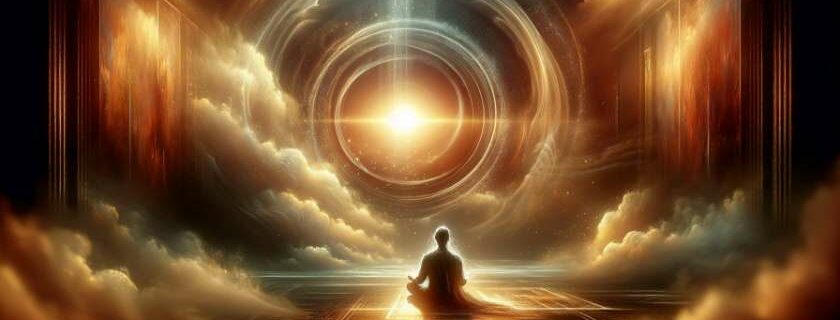Many question the existence of a creator and the origins of life and the universe. We grapple with questions about life, death, and our destiny. We wonder about the prevalence of pain, sickness, greed, and evil. These inquiries often lead to more questions and conflicts.
Some turn to science for answers, overlooking God. Yet, God is the creator of science. Recognizing God as the origin of life and the universe brings wisdom and faith that answer our doubts. This leads to the realization that God is indeed real.
Key Takeaways
- Science and belief in God can coexist, showing that scientific exploration and spiritual faith are not necessarily contradictory.
- Archaeological discoveries and historical research can reinforce beliefs about God. Findings from the past can provide context and evidence for religious narratives.
- Learning about how miracles can reinforce belief in God can allow us to explore the impact of extraordinary experiences on faith and spirituality.
Contents

Is There A God?
Yes, there is a God. Undeniably, God exists. This conviction in a supreme entity is not merely a belief, but a truth that is deeply embedded in diverse religious and philosophical doctrines globally. This faith provides individuals with not just comfort but a profound sense of purpose and direction.
The existence of God is seen in the intricate creation and meticulous order of the universe, as well as in the realms of morality and spirituality.
God: Creator And Supreme Being
God, the creator of the universe and all beings, also created love. He desires fellowship with us and plans for our good. Humans, His most significant creation, are made in His image for a relationship with Him. Despite His might, He is full of unconditional love and mercy.
Atheism: There Is No God
Atheism[1], in simple terms, denies the existence of God or any supernatural power. Atheists, who come from diverse intellectual backgrounds, reject the necessity of deities for life fulfillment. They believe the universe originated from the Big Bang.
Agnosticism: A Wavering Faith
Agnosticism questions the existence of a divine being, contrasting with theism’s belief in an omnipotent creator and atheism’s rejection of gods. Agnostics frequently identify as “doubting Thomas,” named after the biblical figure.
Paganism: Worshiping The Wrong God
Paganism, an ancient spiritual practice, embraces diverse beliefs and practices rooted in nature, reverence, and ancestor worship. Often viewed as non-religious due to its denial of God’s existence, its practitioners focus on nature relationships, like land and seasons, shaping their understanding of their universal role.

Is God Real?
Yes, God is real. This is strongly supported by the testimonies of those who have encountered Him. Eyewitness accounts serve as a major component of the evidence for God’s existence.
The Bible also shares stories of life-changing encounters with God. Archeology also aids in seeking evidence of God’s reality. Archeological discoveries validate many Biblical events and offer insights into the Biblical world.
Miracles are another way that God reveals himself to us. These can range from healings to acts of protection and more. Though something as extraordinary as a miracle does not happen every day, the testimony of those who have seen God’s miraculous power is both inspiring and undeniable.

Can Science Prove That God Exists?
The question of whether science can prove God’s existence is complex. Science, dealing with the physical and natural world through observation and experimentation, cannot definitively prove or disprove God’s existence. This is because God is supernatural and beyond empirical measurement or observation.
Science can explore aspects of the universe, like life’s complexity or the universe’s vastness, leading some to believe in a higher power. However, God’s existence is a matter of personal belief, faith, or philosophical understanding, not something provable by science.
This topic intersects with theology, philosophy, and personal belief systems. Notably, many scientists hold religious beliefs and see no conflict between their faith and scientific work, while others do not hold religious beliefs. The relationship between science and religion is deeply personal and subjective.

How Do We Know If God Is Real?
We know God is real in various ways, and these can include the Word of God, sheer faith, and archaeology.
1. The Word Of God
The Bible is a unique source that provides overwhelming evidence for the existence of God. Its pages reveal a world that is filled with majestic beauty, powerful miracles, and divine power. As evidence, the Bible contains many prophecies that have been fulfilled with remarkable accuracy. Through its narratives, we can see a God who is in complete control of history.
2. Sheer Faith
Christian faith means having sheer belief and trust. Our faith in God is a foundational part of human life and reveals to us that He exists. We can see how He is present in our lives, our families, and our communities, providing us with meaning, strength, and guidance.
3. Archeology
Archeology provides incredible evidence that can corroborate many historical events and uncover the secrets of the past. It can also provide evidence of something more profound: the existence of God.
The Bible is full of references to archeological discoveries that have been corroborated by subsequent excavations. The walls of Jericho and the widespread destruction of Sodom and Gomorrah are two of the most notable examples.

Where Can We Find Information About God?
We can find information about God’s existence through various sources. The Bible is the primary resource, offering insights into God’s history, His interactions with humanity, and His divine plan for us. Books, websites, and other sources, including ancient and modern Christian literature, also provide a valuable understanding of the Lord and His will.
Archeology has also been immensely useful in understanding more about God. By studying the artifacts and ruins of ancient civilizations, we can learn more about the religious practices of ancient peoples and how they interacted with God daily.
Likewise, the study of culture and history provides a valuable record of God’s work in people’s lives across time and gives us a greater understanding of how to prove God’s existence and how He has shaped the world.

Seven Lists Of Proof That God Is Real And Exists
1. Creation Demands A Creator
God is our Creator. He is responsible for the creation of the universe, the heavens and the earth, our lives, the Earth and its mountains and seas, animals, plants, birds, stars, time, light, and darkness. He even gave us the breath of life.
The Bible describes in detail how God created the world in six days. First, He divided the light from the darkness, making day and night. He followed this by creating the sun, moon, and stars. During the next three days, He created land and vegetation, the sea, and all kinds of animals. Finally, He created human beings, Adam and Eve.
2. God Is Our Life-Giver
God is indeed our life-giver. Science has explained much about our physical existence, but life itself, a gift beyond scientific grasp, is seen as given by a higher power. This belief in God as the life-giver is a truth for believers, reflecting enduring faith in God as the source of all life.
Jesus Christ is our great provider, and it is through Him that we receive life. This life is a sacred gift, and it is given freely to all of us, regardless of our faith, belief system, race, or socioeconomic status. We are all blessed with the same gift: the opportunity to live a life full of joy, love, and beauty.
3. Laws Demand A Lawgiver
Humans have long looked to God as the ultimate lawmaker. This view gained even greater support with the advent of the natural laws espoused by great thinkers such as Albert Einstein.
The idea of a divine being establishing laws from which we must abide is a powerful one and has long been used as a foundation for systems of governance. The Bible states that when it comes to justice, God is our ultimate judge and has the last word.
4. God Is Our Master Designer
Observing our surroundings, we see remarkable designs everywhere. Humans, too, embody this design, serving as evidence of a divine entity. Our lives are filled with intricate creations, from homes and cars to food. We’ve constructed microprocessors, aircraft, rockets, and varied recipes. The human body showcases God’s splendid design.
Design experts highlight three elements: functionality, efficiency, and safety. These traits suggest God as our supreme designer.
5. Fulfilled Prophecies
Numerous fulfilled prophecies indicate that God exists. Jesus Christ is the savior of mankind, and more than 100 prophecies foretold His coming as the Messiah. The Bible supports the idea that God exists by providing evidence that these prophecies have been fulfilled.
For example, when Jesus was born in Bethlehem, a prophecy foretold that a ruler would come from Bethlehem. The Bible further states that he was born to a virgin and that he would be rejected by his people. These prophecies have all come true, indicating the existence of God.
6. God Answers Our Prayers
When it comes to finding proof of the existence of God, we must look no further than our own answered prayers. Through prayer, we can communicate with God, and He can hear us. He knows our needs, our fears, and our wishes, and He loves us deeply.
After all, He created us, and He desires us to worship Him. When we pray for a need that is within His will, we can rest assured that He will answer in one way or another.
7. A Changed Life
A changed life provides a powerful example of the transformative power of God and the proof that a faithful relationship with Him can bring. We all have moments of darkness when the burdens of life seem too heavy to bear.
When we are in such a place of unrighteousness, it can be difficult to see the hope of turning our lives around to become a new creation. But when we allow the Holy Spirit to enter our hearts and souls, we enable a transformation that only God can provide.

Summary
Many people today either don’t believe in Jesus Christ or question the existence of a Creator. Some even misdirect their faith and worship. Despite efforts to debunk creationism, it often withstands scientific scrutiny, leading many to infer an intelligent designer behind the universe.
Our limited understanding of this entity is due to its immense complexity. The existence of life suggests proof that God exists. We, along with the universe, are His creation.
Frequently Asked Questions
Do Scientists Believe In God?
Beliefs in God among scientists vary widely. According to a poll by the Pew Research Center, just over half of scientists (51%) believe in some form of deity or higher power; specifically, 33% of scientists say they believe in God, while 18% believe in a universal spirit or higher power.
How Many People Believe In God?
The number of people who believe in God varies greatly around the world. According to a survey conducted by the Pew Research Center in 2014, 63% of respondents said they were “absolutely certain” in their belief in God. However, a Gallup poll showed that in 2022, 81% of U.S. adults said they believed in God.

The definition of God as perfect who knows everything, that is past, present and future negates almost about every thing that the bible is saying. The bible portrays that god make mistakes like creating the devil in the first place. God is so perfect that only human robots yearn for praise, recognition or worship. People are just imagining or falsely assuming that god talk to them. I believe through logic that we are only human robots that everything that we do or happen to this life is cause by god since we are not perfect. I am a genuine seeker of god and consider myself as just an insignificant human robbot. God gave me a mind to question him/her or it but do not want to answer. If you got in touch with god, no assuming or guessing please, I humbly request he/she or it give me a visit because a have thousands of questions waiting to be answered.
Hello Mustan. Firstly God is perfect and he does know everything. He created the whole entire universe. God does not make any mistakes. The very fact that he knows everything and has unlimited knowledge means that he can make no mistakes. He is perfect and he made the angel Lucifer (now known as Satan) blameless but he gave them free will just like he gives us free will. Satan’s pride led to rebellion against God and ultimately he was cast down out of heaven with the angels he had deceived. They were made perfect and good but they had the choice to choose evil. Just like Adam and Eve. That to me shows the amazing love of God. ‘Human robots’ would be people who are forced to worship God but in reality we all have choices. Whether we want to choose to do good or evil. Choose God or the devil. Choose eternal life or eternal punishment. I hope this brought you some clarity, have a good day!
First of all, the Universe did not create itself. Creation needs a creator. If you have time, please read this article; it debunks the Big Bang theory.
https://www.forbes.com/sites/startswithabang/2017/09/21/the-big-bang-wasnt-the-beginning-after-all/?sh=3019f62b55df
Do you disbelieve everyone that claims knowledge of God or a creator; I hope not. I had an encounter three years ago with, what I believe, was God or Jesus or some angelic being. I was suffering from Covid and was dying in bed. I asked God to take me home or give me a reason to go on. Within 5 to 8 minutes of my request, my bedroom lit up with flakes of gold buzzing around the room. My intense headache left my forehead immediately, I started crying uncontrollably and was acutely aware someone or something was in the room with me. I was unable to get out bed before the encounter and was so dehydrated that I could not pee. This experience lasted about 6 minutes total. The Gold evaporated like a vapor and I felt a strong sense of love and calmness after it was gone.
I use to be skeptical of people’s stories about encounters they had like mine. It is hard to believe something like this can happen if you’ve never experienced it yourself. I am not here to convince you that God is real, but please don’t disregard other’s experience as pseudo. With an open mind and a little trust you may one day have a similar experience.